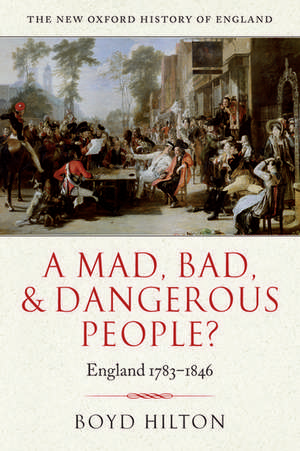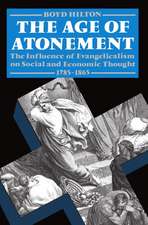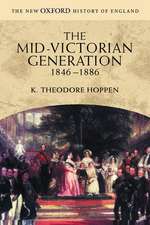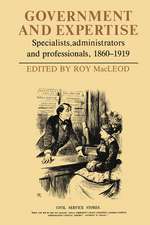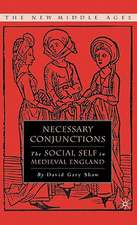A Mad, Bad, and Dangerous People?: England 1783-1846: New Oxford History of England
Autor Boyd Hiltonen Limba Engleză Paperback – 19 iun 2008
Preț: 341.22 lei
Preț vechi: 409.61 lei
-17% Nou
65.30€ • 67.92$ • 53.91£
Carte disponibilă
Livrare economică 13-19 martie
Livrare express 07-13 martie pentru 129.02 lei
Specificații
ISBN-10: 0199218919
Pagini: 784
Ilustrații: 8pp plates
Dimensiuni: 156 x 235 x 38 mm
Greutate: 1.18 kg
Editura: OUP OXFORD
Colecția OUP Oxford
Seria New Oxford History of England
Locul publicării:Oxford, United Kingdom
Descriere
This was a transformative period in English history. In 1783 the country was at one of the lowest points in its fortunes, having just lost its American colonies in warfare. By 1846 it was once more a great imperial nation, as well as the world's strongest power and dominant economy, having benefited from what has sometimes (if misleadingly) been called the first industrial revolution. In the meantime it survived a decade of invasion fears, and emerged victorious from more than twenty years of war to the death against Napoleonic France. But if Britain's external fortunes were in the ascendant, the situation at home remained fraught with peril. The country's population was growing at a rate not experienced by any comparable former society, and its manufacturing towns especially were mushrooming into filthy, disease-ridden, gin-sodden hell-holes, in turn provoking the phantasmagoria of a mad, bad, and dangerous people. It is no wonder that these years should have experienced the most prolonged period of social unrest since the seventeenth century, or that the elite should have been in constant fear of a French-style revolution in England.
The governing classes responded to these new challenges and by the mid-nineteenth century the seeds of a settled two-party system and of a more socially interventionist state were both in evidence, though it would have been far too soon to say at that stage whether those seeds would take permanent root. Another consequence of these tensions was the intellectual engagement with society, as for example in the Romantic Movement, a literary phenomenon that brought English culture to the forefront of European attention for the first time. At the same time the country experienced the great religious revival, loosely described under the heading evangelicalism. Slowly but surely, the raffish and rakish style of eighteenth-century society, having reached a peak in the Regency, then succumbed to the new norms of respectability popularly known as Victorianism.
Recenzii
A scrupulously complete analysis of political and social change...
History writing at its most compelling.
The range, richness and complexity of Boyd Hilton's text are impossible to convey in summary, and hard fully to appreciate in a single reading. A mastery of the voluminous literature is complimented by an acquaintance with the sources which produce a wealth of illuminating quotation to catch the tones and inflections of the age...The analysis it offers, and the proportions and emphases which it adopts, will galvanize debate for years to come, and make it a contribution to history such as a safer survey, less ambitious in design, enterprising in argument, and integrative in technique, could not be.
Trenchant, vivid, massively researched and very well written
The main narrative is interspersed with fascinating essays on science, religion, art, architecture and literature - a generous helping for the many people who will read this book for pleasure rather than profit.
Boyd Hilton has produced a tour de force that will stimulate interest in and guide understanding of the period for years to come.
A lively and wide-ranging study...[a] comprehensive, intriguing and challenging volume that has proved well worth the wait.
This book, like its companion volumes, takes for its subject English society as a whole, and the Byronic nudge of the title, as well as promising entertainment, is meant to alert us to the idea that the years before the Victorian Reform Acts were ones of violence, apprehension and 18th century debauchery.
A model of the historian's art and a trailblazing marriage of intellectual and political history
A magnificent contribution
